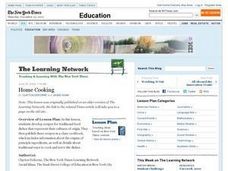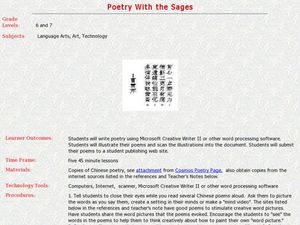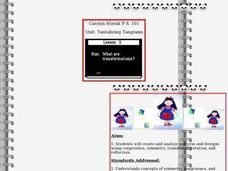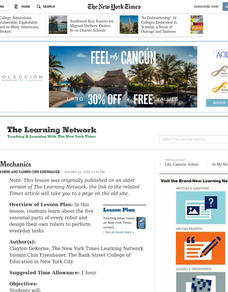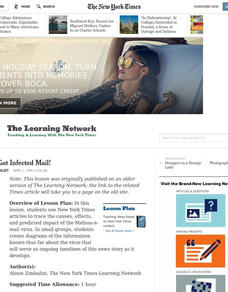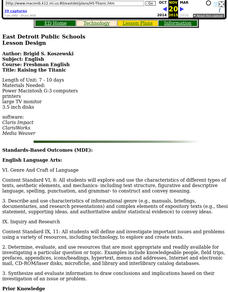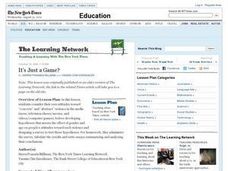Curated OER
Home Cooking
Students explore the link between home and food in a writing exercise. They study and discuss how some Hispanic immigrants keep in touch with their culinary origins. They develop a recipe that represents their ethnic origin. They...
Curated OER
Simple Machines
Fifth graders create a Power Point presentation to relate to their study of simple machines. They create a title page, a page introducing six simple machines, slides explaining real world use to each simple machine and import pictures...
Curated OER
A Comparison of Two Great Leaders: Mahatma Gandhi and Martin Luther King Jr.
Students explore these two leaders use of nonviolent protest techniques. They read about the life of King Jr. They view a slide show about the life of Gandhi. Compare/contrast the lives of these two men using a Venn diagram.
Curated OER
Special Edition Newspaper on the Trial of Julius Caesar
Tenth graders research the multiple perspectives held by the participants in the trial relative to the conduct and outcome of the trial. Practice writing pertinent and penetrating interview questions for oral interviewing. Take a...
Curated OER
The Jury's Still Out
Learners examine the trials and executions of Nicola Sacco and Bartolomeo Vanzetti. In groups, they use the internet to research the impact of the executions in the shape of political cartoons and writings. They discuss an article to...
Curated OER
Weapons of World War I
Ninth graders discover the weapons of World War I. They compare and contrast the weapons used during that time period with the weapons that are used in warfare today. They create a digital slide show with the history, uses, and...
Curated OER
Fredrick Douglass...A Digital History
Seventh graders research the life of Fredrick Douglass. In this Fredrick Douglass lesson, 7th graders read about his life and discuss it. They write poetry describing his experience as a slave and create their own monument for Fredrick...
Curated OER
Poetry With the Sages
Learners write poems and input them into a word processing program. In this poetry lesson, students listen to Chinese poems and draw mental images. Learners compose poems and illustrate them. Students share their work.
Curated OER
Tantalizing Tangrams: What Are Transformations?
Students use the Internet to learn about transformations and tessellations. In this geometry lesson, students use the Internet to define the meaning of reflections, translations, rotations, glide reflection and symmetry. ...
Curated OER
Write a Radio Show
Students use the writing process to write a radio show. In this writing process lesson, students need to effectively use the writing process to create a radio show and then present to the class. Member of the group take...
Curated OER
Lewis and Clarke Composition
Learners write a narrative story about the Lewis and Clarke Expedition. In this narrative writing lesson plan, students write a narrative story including themselves in the expedition. Learners include aspects of narrative story writing,...
Curated OER
The Mayflower Compact
Eighth graders investigate historical documents of the United States by reading the Mayflower Compact. In this U.S. History lesson, 8th graders analyze the wording of the original Mayflower Compact of the first U.S. settlers and...
Curated OER
Innovation of Our Generation
Students identify the innovations that have impacted their lives. In this inventions lesson students write and present a speech on the greatest innovation of their generation.
Curated OER
Intervene or Interfere?
Students research the motives, actions, and results of U.S. intervention in foreign affairs between the 1961 Bay of Pigs invasion and the 2003 invasion of Iraq.
Curated OER
Bootleg Bytes
Learners conduct background research to explore the positions of different groups involved in the digital piracy debate, then participate in a fishbowl discussion that seeks to find a consensus on the issue.
Curated OER
When Moore Is Less for Microprocessors
High schoolers in technology classrooms review how microprocessors work, examine Moore's Law, and relate it to the predicted end that is in sight for silicon dioxide-based transistors used in billions of chips.
Curated OER
Popular Mechanics
Students explore the five essential parts of every robot and design their own robots to perform everyday tasks. They explore robots created for fighting competitions by reading and discussing "When Nerds Collide: Robots at War."
Curated OER
You've Got Infected Mail!
Students use New York Times articles to trace the causes, effects, and predicted impact of the Melissa e-mail virus. In small groups, students create diagrams of the information about the virus that serves as ongoing timelines of this...
Curated OER
What's Old Is New Again
Students explore cultural trends in the United States in the 20th century and examine the resurgence of some of those trends in today's society.
Curated OER
Raising the Titanic
Ninth graders research the history of a person who was aboard the Titanic and write about the part he/she played in the world's greatest maritime disaster.
Curated OER
Stamp of Approval
Students share opinions about what constitutes a worthy design for a postage stamp. They research a subject and design a postage stamp to submit to the United States Postal Service.
Curated OER
It's Just a Game?
Students consider their attitudes toward concrete and abstract violence in the media before developing hypotheses that assess the effect of gender and age on people's attitudes toward such violence and designing a survey to test those...
Curated OER
Occupational Oxymoron
Students consider their own notions of poverty, examine the life of a woman classified as "working poor" from a variety of perspectives, and present their findings to the class. Then, students synthesize their knowledge in a paper.
Curated OER
Over-the-Counter Culture
Students explore the changing consumer habits of Americans of various socioeconomic classes. They examine the exact costs of products, services and interest rates mentioned in the article and reflect on their own spending habits and...


